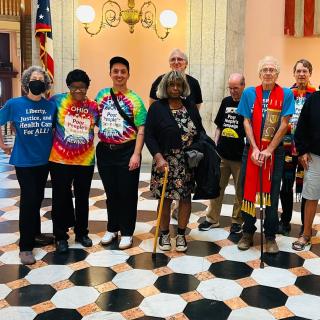Advertisement
WHAT: Oil and Gas Land Management Commission public hearing and business meeting
WHEN: Monday, April 10, at 10 a.m.
WHERE: Ohio Department of Natural Resources, 2045 Morse Road, Building E, 1st Floor Assembly Center, Columbus, OH 43229
The Oil and Gas Land Management Commission will hold a hearing on Monday, April 10, to hear public testimony on Draft Rule 155-1-01, which will create the process for granting oil and gas industry leases for fossil fuel extraction from Ohio public lands.
In attendance will be a group of dedicated Ohio citizens and users of Ohio state parks and forests to call out the oil and gas industry’s grab of our public lands.
We demand robust public notice and commenting for all parcel nominations, no surface impacts in our most treasured spaces, a consideration of the health and climate impacts of fracking, and no fracking to fund tax cuts for the rich.
BACKGROUND
After the passage of HB 507, which compels state agencies to lease public land for oil and gas extraction, the Oil and Gas Land Management Commission proposed a draft rule to oversee these leases. The April 10 hearing is part of the administrative process for approving that rule.
Draft Rule 155-1-01 is only three sentences long and has several significant flaws. Below are four areas where advocates will raise serious concerns about the draft rule during Monday’s hearing.
Our testimony regarding the draft rule follows the filing of a lawsuit and request for preliminary injunction against HB 507 on Thursday.
Lack of public notice and comment
The draft rule includes no procedures for notifying the public when a parcel of our land is being nominated for oil and gas extraction, or a chance for the public to provide comment.
Previously, in 683 written comments and 15 in-person testimonies, advocates asked the commission to add six points regarding public notice and comment to the draft rule. These points included 60 days for public comment, email notification, and online parcel maps.
The commission added none of our asks to the draft rule, instead relegating reduced versions of these asks to agency guidelines that do not have the force of law.
Discrepancies on surface use impacts
Also of great concern is the discrepancy between Gov. Mike DeWine’s statements and the draft lease form regarding surface use impacts of fracking on public land, such as frac pads, pipelines, access roads, timber removal, water withdrawals, and more.
In signing HB 507, DeWine issued this statement: "I am instructing the Director of the Department of Natural Resources to continue to follow the processes first established by the General Assembly in 2011 in this area. This includes continuing my administration’s policy of prohibiting any new surface use access in our state parks."
Yet the lease form tells the oil and gas industry that while the commission cannot grant surface use, the industry can work out a separate agreement with the state agency to get all the surface impacts they want – behind closed doors with no public notice, comment, or oversight.
Health and climate impacts
A third area of concern is the complete lack of regard for the copiously documented impacts of fracking on public health and the climate. Years of research have documented the deleterious health effects of fracking. Physicians for Social Responsibility has for nine years published a compendium of this research. The 2022 compendium contains 2000 links and abstracts.
Likewise, the Intergovernmental Panel on Climate Change just last month released its sixth Synthesis Report, a final warning on the climate crisis, emphasizing the urgent need to limit warming to 1.5C above pre-industrial levels before runaway warming becomes irreversible.
Methane emissions from oil and gas operations are dangerous to human health and a key driver of the climate crisis. Yet the commission has never discussed the effects of fracking on health or climate.
Fracking to fund tax cuts for rich
A fourth area of concern is the economic aspects of fracking on public land. Senate President Matt Huffman said he wants to use the proceeds to pay for tax cuts that disproportionately benefit the wealthy.
Yet the fiscal analysis of HB 507 says income from fracking on public land is uncertain. A report by the Ohio River Valley Institute found fracking did not bring jobs to seven counties in Eastern Ohio - in fact, these counties saw a net job loss and population decline.
Meanwhile, a study by Ohio State University found that Ohioans’ use of outdoor spaces contributes $8.1 billion to the state’s economy. Our parks are worth much more preserved as places for hiking, camping, and fishing than fracked.
Frack wells can only be fracked a few times before they run dry, so fracking income is not continuous whereas recreation income is.
Our response:
You may use the following quotes regarding the April 10 hearing, Draft Rule 155-1-01, and HB 507:
"We are at the tipping point in relation to climate disruption and still our state officials play with climate as if they are at a tea party. The Oil and Gas Land Management Commission is in violation of the public trust and rule of law ignoring the science of climate change. We must continue to resist the sellout of our public lands by the DeWine and previous Kasich administration and stand for the future of our children, grandchildren and species that depend on our public lands. This matters!"
Loraine McCosker, Public lands and Forest protections advocate, Athens
“ODNR and the oil and gas industry have been trying to marginalize the public concerns of fracking in Ohio for over a decade. The agency has defied science and medical facts about the harms of fracking, and now the commission appears to be dismissive of those same truths. It is utter hypocrisy in saying you care about our planet while agreeing to destroy it.”
Roxanne Groff, longtime environmental advocate, Athens
“The idea that we should frack our most treasured spaces in Ohio to provide tax cuts for the rich is as appalling as it is ludicrous. Polluting and degrading our parks won’t produce a steady source of income. Preserving our parks for Ohioans to enjoy now and in future generations will. Ohio’s untouched natural spaces are our most important asset, and we must protect them.”
Cathy Cowan Becker, longtime environmental advocate, Columbus



